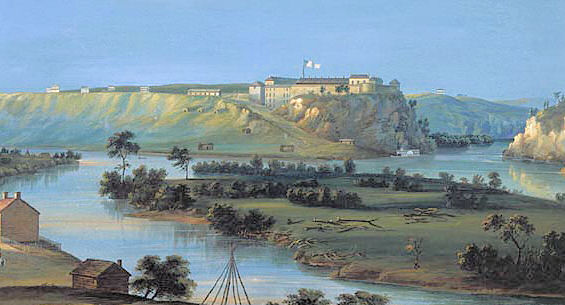
Fort Snelling in 1844. Today the trees are so thick and high all around that you can’t see the river from the fort.
On Independence Day I took an out of town visitor to see Historic Fort Snelling, our major local historical site, which has been reconstructed to appear as it did around 1820, and is staffed by costumed interpreters. I’m glad I did, because I came up with a couple article ideas which I don’t intend to squander on you lot of freeloaders, but to sell to The American Spectator Online (or so I hope).
The temperature was officially 101º, which gave us a vivid lesson in life before air conditioning (consumer report—it was bloody uncomfortable). But at least I wasn’t marching around in a wool uniform like the support staff. (We Vikings generally wear linen tunics in the summer, even though they’re not strictly vouched for by archaeology. Those authenticity officers know there’s a point beyond which you can’t push a guy with an axe.)
The main problem with Fort Snelling is that it’s not all that memorable, in historical terms. Nothing big really ever happened there. Graf von Zeppelin spent some time there as an observer, before going home to invent the dirigible. General Custer cooled his heels there for a while in temporary disgrace, before being called back west for his Date with Destiny.

Dred Scott. Continue reading Great Scott





